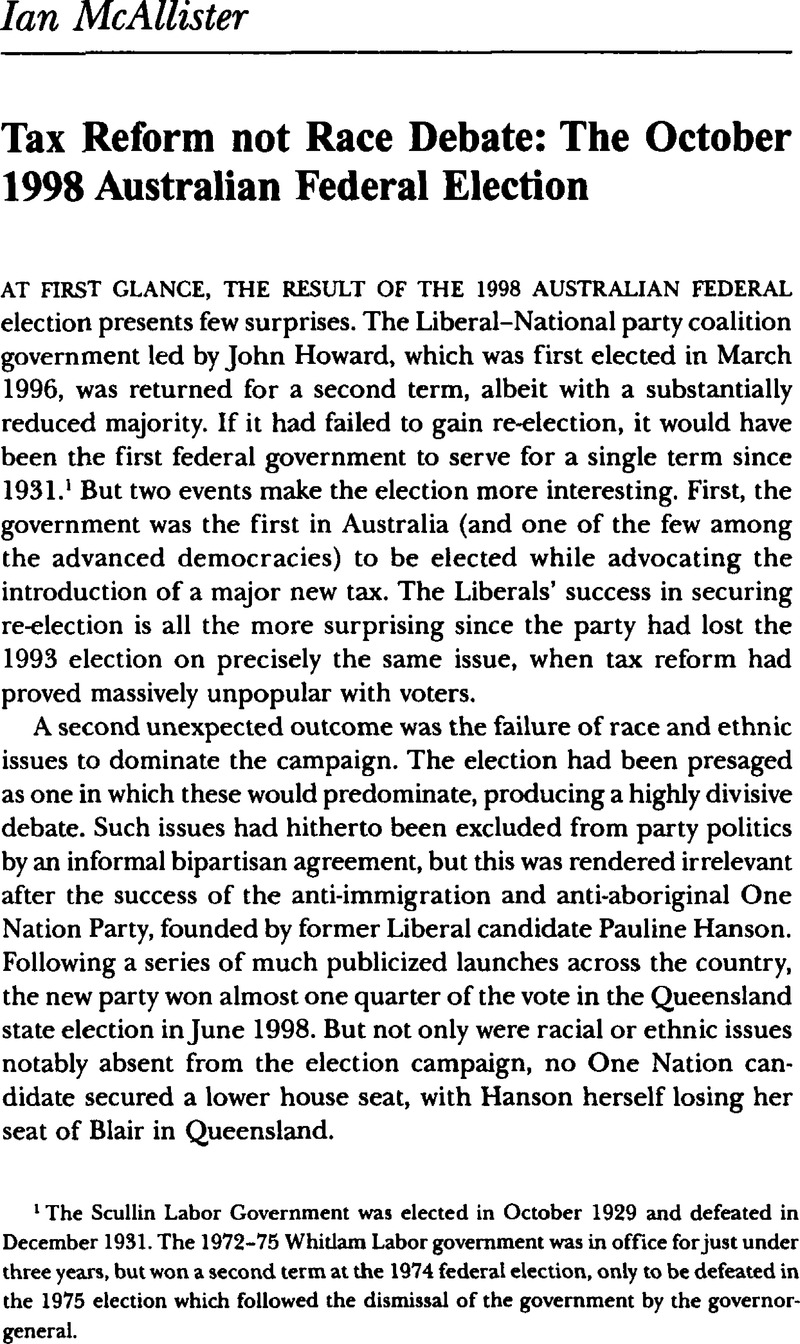Article contents
Tax Reform not Race Debate: The October 1998 Australian Federal Election
Published online by Cambridge University Press: 28 March 2014
Abstract

- Type
- Articles
- Information
- Copyright
- Copyright © Government and Opposition Ltd 1999
References
1 The Scullin Labor Government was elected in October 1929 and defeated in December 1931. The 1972–75 Whitlam Labor government was in office for just under three years, but won a second term at the 1974 federal election, only to be defeated in the 1975 election which followed the dismissal of the government by the governorgeneral.
2 Peter Groenewegen, ‘Federalism’ in Head, Brian and Patience, Allan (eds), From Fraser to Hawke, Melbourne, Longman Cheshire, 1989 Google Scholar.
3 Brian Easton and Rolf Gerritsen, ‘Economic Reform: Parallels and Divergences’, in Francis Castles, Gerritsen, Rolf and Vowles, Jack (eds), The Great Experiment, Sydney, Allen & Unwin, 1996, p. 38 Google Scholar.
4 The Australian, 3 May 1995.
5 For example, on 27 May 1997 a conference to commemorate the passing of the 1967 amendment to the constitution which granted aborigines certain rights resulted in many of the audience turning their backs on the prime minister in disapproval.
6 Commonwealth Parliamentary Debates, House of Representatives, Volume 192, 10 09 1996 , p. 3860Google Scholar.
8 The previous defection of a major party leader occurred in February 1931 when Joe Lyons, then a senior minister in the Scullin Labor government, defected from Labor to the Nationalists. In May 1931 he became leader of the opposition, and leader of the new United Australia Party (in effect, the Nationalists under a new name). In December 1931 his party won the general election and he was prime minister until his death in 1939.
9 For example, in his maiden speech, a One Nation MP, Jeff Knuth, stated: ‘The great doublecross of them all was Prime Minister Howard’s knee‐jerk reaction on the firearm laws, allegedly because of Port Arthur. We now know that Port Arthur had nothing to do with it. That was only the excuse to slug Australians with extremist laws long hidden away in the files, laws hidden away in the dark bogholes of Canberra, awaiting the day when Australian law makers could be scared into passing laws hatched in a far away foreign capital to better fit Australians into their glorified international mould.’ Queensland Parliamentary Debates, 30 July 1998, p. 1477.
10 In addition to wholesale tax, nine other state taxes were to be abolished: financial institutions duty; debits tax; stamp duty on marketable securities; conveyancing duties on business property; stamp duties on credit arrangements, instalment purchase arrangements and rental (hiring) agreements; stamp duties on leases; stamp duties on mortgages, bonds, debentures and other loan securities; stamp duties on cheques, bills of exchange and promissory notes; and ‘bed taxes’.
11 By devising the plan before the election was called, the Liberals were able to utilize the resources of the federal public service, including a $10m government‐funded advertising campaign to promote the change.
13 The Melbourne Age, 24 July 1998.
14 A referendum on statehood for the Northern Territory was also conducted in conjunction with the federal election in the Northern Territory. Voters rejected the proposal for statehood, 52.8 to 47.2 per cent.
15 In the safe Labor seat of Newcastle, one of the candidates died during the course of the election campaign. The election was halted, and a by‐election was held on 21 November and won by Labor.
16 By comparison, Labor lost 28 seats in 1996 and the Liberals 24 in 1983. The record loss occurred in 1975, when Labor, led by Gough Whitlam, lost 30 seats.
17 Two sitting National Party MPs, Bob Katter and De‐Anne Kelly, fearing the loss of their seats to One Nation, had attempted to compromise with the One Nation Party policies. In each case, they took the controversial decision to direct their preferences to One Nation over Labor.
18 Bean, Clive, ‘The Personal Vote in Australian Federal Elections’, Political Studies, 38:2 (1990) pp. 253–68.CrossRefGoogle Scholar
19 In a half Senate election, six senators of the twelve senators representing each state are up for election, plus two each from the Northern Territory and the Australian Capital Territory.
20 Namely, Aiden Ridgeway, for New South Wales. The first aboriginal parliamentarian was Senator Neville Bonner, who represented Queensland in the Senate from 1971 until 1983.
21 The Australian, 5 October 1998.
22 Ian McAllister, ‘Immigration, Bipartisanship and Public Opinion’, in Jupp, James and Kabala, Marie (eds), The Politics of Immigration, Melbourne, Bureau of Immigration Research, 1993.Google Scholar
- 1
- Cited by


